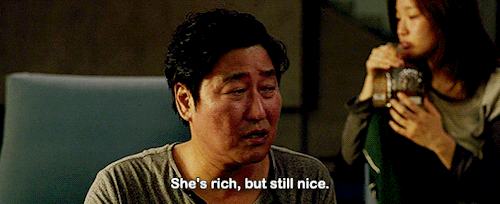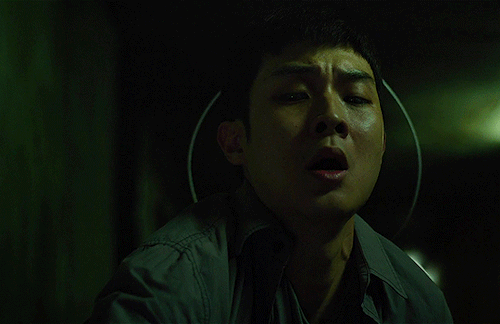South Korean filmmaker Bong Joon-ho has often tackled class warfare in his films, usually through the eyes of the struggling lower class. Not every director has a singular point of view that they naturally gravitate to, but this is Joon-ho’s, and we’ve seen it explored in massive futuristic sci-fi dramas like Snowpiercer, in grounded noir thrillers such as Mother, and more. Joon-ho’s harsh critique of the divide in Korean culture has never been more stark, or enjoyably maniacal, than with Parasite, a dark satire that took home the Palme d’Or at Cannes.
At least initially, Parasite appears to share DNA with Hirokazu Koreeda’s Cannes favorite, Shoplifters. We’re introduced to the Kim family, an impoverished clan of grifters pushed to subterranean levels, living in a fetid hovel overrun with bugs. When the neighbor password protects the Wifi, unemployed patriarch Ki-taek (Joon-ho favorite Song Kang-ho) tells his two kids to raise their cell phones high and into every wretched corner. Somehow, this unlikely plan works. When the fumigators come to defog the slum in which they live, Ki-taek says to keep the windows open to get a free clean. The impact of Korea’s competitive job market has made keeping an occupation worth dying for. Or worse.
Like many of Joon-ho’s films, the central plot is never what it appears to be. The less said about Parasite the better, as its twists and turns throws you into a constant loop of terror, amusement, and disbelief. The Kims may seem like harmless leeches on society, or parasites even, but their petty schemes begin to expand when son Ki-woo (Choi Woo-shik) falsifies his credentials so he can go and work for the wealthy Park family, tutoring their young daughter in English. Ki-woo steps into the Park home, a glass menagerie that feels more like a cage, and gets a taste of what the good life is really all about. Just that small taste is enough for the Kims to hatch a diabolical, high-wire plan to become invaluable to the Parks so as to reap the rewards of being near their wealth.
What makes Parasite great isn’t necessarily the richness of Joon-ho’s social commentary. In that, he’s actually pretty blunt and unsubtle. The poor stay poor and live, literally in some cases, underground where they can be ignored by the wealthy, who are incredibly naïve, arrogant, and ignorant. The wealthy are so ignorant they don’t know what they don’t know, and we see this play out frequently with the Park’s matriarch, a neurotic ditz whose well-meaning stupidity has her believing any story thrown her way. It’s the sheer brazenness of Joon-ho’s plotting and unbearably tense direction that leaves you stunned and on the edge of your seat. While the director has always been a fan of perpetually-moving plot devices (think his titular train in Snowpiercer), Joon-ho escorts the Kim family through a mounting series of break-neck encounters that just never seem to end and get increasingly more dire. From one room of the Park’s massive home to the next, this rolling chaos offers hysterical insights into wealth’s excesses and the poor’s dire desperation. Always pushing dangerously close to horror’s edge, this social satire transmutes into something with a jet black heart before you even realize it’s happening.
Clocking in at 132 minutes, Parasite can get a bit long in the tooth, but Joon-ho uses every single second to the fullest. He gets the most out of his cast, and as usual a towering lead performance from Kang-ho, who he’s worked with on The Host, Snowpiercer, and Memories of Murder. Everything about the way Kang-ho carries himself speaks to Ki-taek’s resignation that he will forever be seen as common. While Ki-taek outwardly shows dignity at his life in service, there’s something eating away at home that it’s all he will ever be. The scene-stealer for me was Cho Yeo-Jong as the ditzy Mrs. Park. In contrast to Ki-taek, Mrs. Park has probably always been waited on by others, and she simply doen’t know anything beyond the perfect life right in front of her face. This doesn’t maker her a bad person, just a clueless, good-natured one. Joon-ho doesn’t really judge any of his characters here, even when it would seem like he should considering some of the horrendous actions they take.
Every frame of by cinematographer Hong Kyung-pyo emboldens Joon-ho’s vision of the vastly different worlds his characters occupy. The Park homestead is an architectural masterwork of labyrinthine proportions, captured in wide framing that accentuates the family’s glut. Conversely, it always feels like the walls are caving in at the Kims’ squalid home; I don’t know if we ever see them standing up right in it. That feeling of always being prostrate never leaves, either. It stays on the Kims like a fungus, like an old smell they can’t quite scrub away.
Parasite may lack the nuanced exploration of class division as Lee Chang-dong’s Burning, it more than makes up for it in shock and entertainment value. By indulging in his own lurid excesses, Joon-ho takes the confrontation between rich and poor to its inevitably violent conclusion, and the scary thing is how right he makes that feel.







